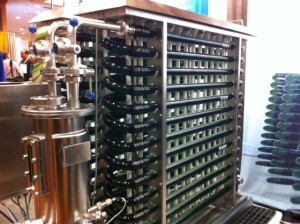First place engineering awards for students at Colorado State University, UC San Diego
DENVER –September 27, 2012 – Six student scientists were presented with the first Young Algae Researcher Awards today in Denver for their contributions to fields of algae biology and engineering on the final day of the 2011 Algae Biomass Summit, the official conference of theAlgal Biomass Organization (ABO).
The awards are presented at the world’s largest gathering of algae industry and academic leaders to recognize outstanding research projects by early-career scientists that are finding new ways to use algae to create a range of renewable fuel and chemical products, remediate polluted water and consume carbon dioxide.
A total of 26 applications and posters were received from U.S. and international students hailing from Canada, Qatar and the Netherlands.
“There were so many highly qualified applications it was hard to make a decision,” said David Levin, of the University of Manitoba. “The future is bright for our industry and our planet with so many young, brilliant and dedicated students.”
The Young Algae Research Awards are presented to winners for research conducted in two subject areas: biology and engineering.
For outstanding research in algae biology awards went to:
1st Prize: Beth Rasala, University of California San Diego, Development of molecular genetic tools for algae biotechnology.
2nd Prize: Justin Ungerer, National Renewable Energy Lab, Sustained photosynthetic conversion of CO2 to ethylene in Synechocystis 6803.
3rd Prize: Henri Gerken, AzCATI at Arizona State University, Advanced characteristics of Chorella vulgaris cell walls by enzymatic degradation.
For outstanding research in algae engineering awards went to:
1st Prize: Esteban Hincapie, Colorado State University, Design of a continuous flow algae harvesting devise: Ultrasonic property measurements and finite element analysis.
2nd Prize: Katerine Napan, Utah State University, Biodiesel production in combination with bioremediation of heavy metals from flue gas using microalgae.
3rd Prize: Alex McCurdy, Utah State University, Biodiesel from algae, yeast, and bacteria: Engine performance and exhaust emissions
The Algae Biomass Summit concludes Thursday afternoon. Information on the event, including a full agenda is available at http://algaebiomasssummit.org. Ongoing developments can also be monitored via the Twitter hashtag #ABS12. Next year’s Summit will be held in Orlando, Florida.
About the ABO
The Algae Biomass Organization (ABO) is a 501 c(6) non-profit whose mission is to promote the development of viable commercial markets for renewable and sustainable commodities derived from algae. Its membership is comprised of people, companies and organizations across the value chain. More information about ABO, including its leadership, membership, costs, benefits and members and their affiliations, is available at the website:www.algaebiomass.org.


